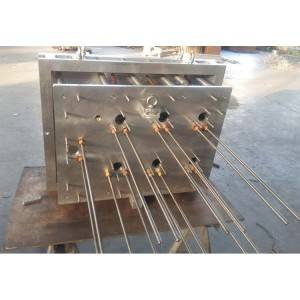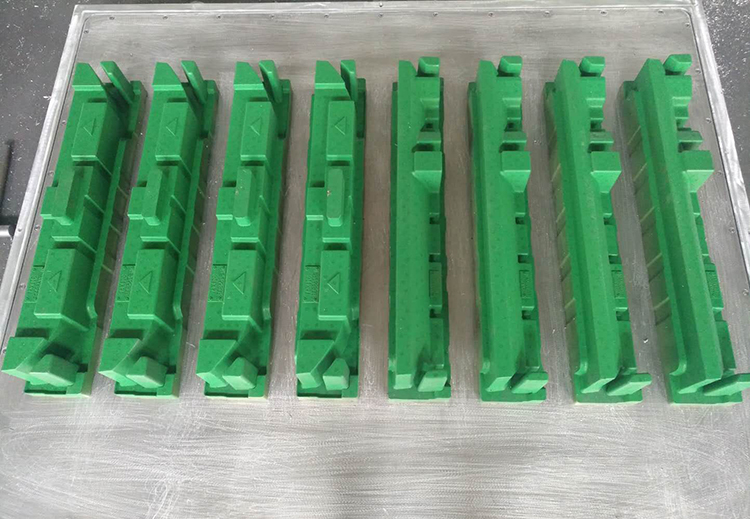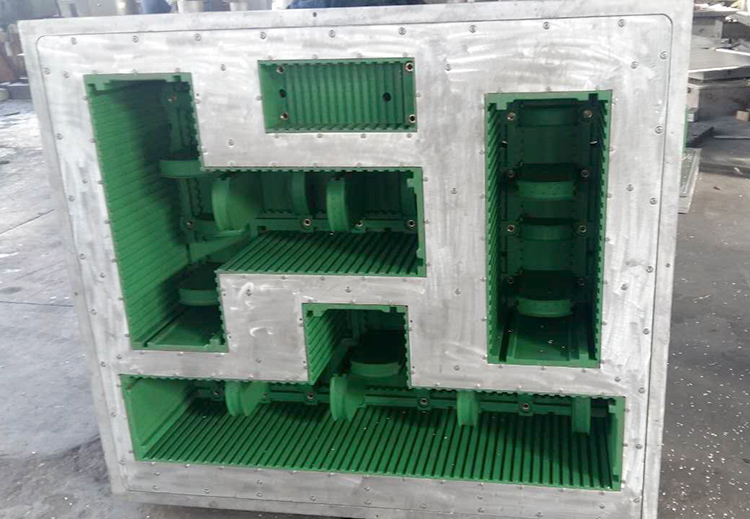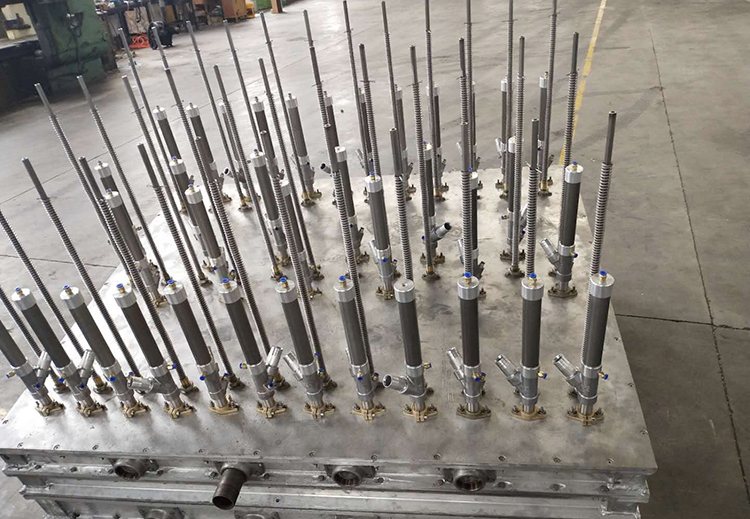Exterior Cornice Moulding - High Quality EPS Mould for Factory Use
Product Main Parameters
| Steam Chamber | Mould Size | Patterning | Machining | Alu Alloy Plate Thickness | Packing | Delivery |
|---|---|---|---|---|---|---|
| 1200*1000mm | 1120*920mm | wood or PU by CNC | fully CNC | 15mm | plywood box | 25~40days |
| 1400*1200mm | 1320*1120mm | wood or PU by CNC | fully CNC | 15mm | plywood box | 25~40days |
| 1600*1350mm | 1520*1270mm | wood or PU by CNC | fully CNC | 15mm | plywood box | 25~40days |
| 1750*1450mm | 1670*1370mm | wood or PU by CNC | fully CNC | 15mm | plywood box | 25~40days |
Common Product Specifications
| Material | Frame | Coating | Durability | Precision |
|---|---|---|---|---|
| High-quality aluminum | Extruded aluminum alloy profile | Teflon coating | Long-lasting | High precision (tolerance within 1mm) |
Product Manufacturing Process
The manufacturing of EPS (Expanded Polystyrene) Exterior Cornice Moulding involves several key steps. Initially, high-quality aluminum ingots are used to create mould plates, which are typically 15mm to 20mm thick. These plates undergo extensive CNC (Computer Numerical Control) machining to ensure precision with a tolerance within 1mm. The mould frames are constructed from extruded aluminum alloy profiles, providing strength and longevity. Careful attention is given to patterning, casting, machining, assembly, and Teflon coating processes to ensure that the moulds are durable, resistant to sticking, and easy to demould. Each mould is rigorously tested and checked for quality before delivery, ensuring reliable performance in factory settings.
Product Application Scenarios
EPS Exterior Cornice Mouldings are widely used in various architectural and construction applications. They are designed for both aesthetic and functional purposes, making them suitable for enhancing the visual appeal of buildings while offering protection against the elements. Common use cases include residential homes, commercial buildings, and public structures. In residential settings, these mouldings add a touch of elegance and classical appeal. For commercial and public buildings, they contribute to a sense of grandeur and architectural integrity. The adaptability to different styles—Classical, Gothic, Baroque, and Modern—makes them a versatile choice for various construction projects.
Product After-sales Service
- 24/7 customer support
- One-year warranty on all EPS moulds
- Onsite technical support available
- Free replacement for any manufacturing defect
Product Transportation
Our EPS moulds are packed in sturdy plywood boxes to ensure safe transportation. We offer multiple shipping methods including air, sea, and ground transport, depending on the client's preference and urgency. Each shipment is insured to provide peace of mind during transit.
Product Advantages
- High precision and durability
- Customizable designs to meet specific factory needs
- Easy to demould with Teflon coating
- Quick delivery and reliable quality control
Product FAQ
-
How long does it take to produce an EPS mould?
The production timeline typically ranges from 25 to 40 days, depending on the complexity and size of the mould.
-
What materials are used in your EPS moulds?
We use high-quality aluminum ingots for the mould plates and extruded aluminum alloy profiles for the frame, ensuring durability and precision.
-
Do you offer customization options?
Yes, we provide custom design services to meet specific factory requirements, including converting customer samples to CAD or 3D drawings.
-
What industries commonly use EPS moulds?
EPS moulds are widely used in the construction, packaging, and manufacturing industries, particularly for producing decorative cornices, packaging materials, and insulation products.
-
How do you ensure the quality of your EPS moulds?
We have a stringent quality control process that includes patterning, casting, machining, assembling, and Teflon coating. Each mould is tested and inspected before delivery.
-
What is the warranty period for your EPS moulds?
We offer a one-year warranty on all our EPS moulds, covering any manufacturing defects.
-
Can your EPS moulds be used with machines from different countries?
Yes, our EPS moulds are compatible with machines from various countries, including Germany, Korea, Japan, and Jordan.
-
What are the benefits of Teflon coating on EPS moulds?
Teflon coating ensures easy demoulding, reduces the risk of sticking, and enhances the longevity of the mould.
-
What types of products can be made using your EPS moulds?
Our EPS moulds can produce a wide range of products, including cornices, fruit boxes, fish boxes, ICF blocks, and electrical packaging products.
-
Do you provide after-sales support?
Yes, we offer comprehensive after-sales support, including 24/7 customer service, onsite technical assistance, and free replacements for manufacturing defects.
Product Hot Topics
-
How Exterior Cornice Moulding Enhances Building Aesthetics
Exterior Cornice Moulding plays a crucial role in enhancing the aesthetics of a building. By adding architectural elements at the junctions where roofs meet exterior walls, these mouldings create a sense of completeness and elegance. They can transform a simple facade into a work of art. In factory settings, precise and high-quality moulds are essential for producing these elements efficiently, ensuring consistency and durability in the final product.
-
The Role of CNC Machining in EPS Mould Production
CNC Machining is pivotal in the production of EPS moulds. It ensures high precision and consistency, critical factors in manufacturing quality moulds. CNC technology allows for intricate designs and tight tolerances, which are essential for factory applications where precision is paramount. This technology reduces human error and enhances production efficiency.
-
Durability of EPS Moulds in Different Weather Conditions
Durability is a significant consideration for EPS moulds, especially for exterior applications like cornice moulding. Our moulds are made from high-quality aluminum alloys and feature Teflon coatings to enhance their resistance to weather conditions. This ensures long-lasting performance even in harsh environments, making them ideal for factory production where reliability is crucial.
-
Customizing EPS Moulds for Unique Architectural Designs
Customization is a key feature of our EPS mould offerings. We can convert customer samples into precise CAD or 3D drawings, allowing for the creation of unique and intricate architectural designs. This flexibility is invaluable in factory settings where specific project requirements need to be met. Our experienced engineers ensure that even the most challenging designs are executed flawlessly.
-
The Importance of Quality Control in EPS Mould Manufacturing
Quality control is a cornerstone of our EPS mould manufacturing process. From patterning to casting, machining, and assembly, each step is meticulously monitored. This ensures that our moulds meet the highest standards of precision and durability. Rigorous testing and inspection before delivery guarantee that our clients receive reliable and high-quality products, essential for maintaining production efficiency in factories.
-
Advancements in EPS Technology and Their Impact on Mould Production
The evolution of EPS technology has significantly impacted mould production. Modern techniques like CNC machining and advanced materials such as high-quality aluminum alloys have revolutionized the industry. These advancements ensure that our EPS moulds are not only precise and durable but also efficient to produce. For factory settings, this translates to higher productivity and reduced downtime.
-
Why Choose Teflon Coated EPS Moulds for Factory Use
Teflon coating offers numerous benefits for EPS moulds, especially in factory use. The coating ensures easy demoulding, reducing sticking issues and enhancing the lifespan of the mould. This results in fewer interruptions in the production process, maintaining a steady workflow. Teflon-coated moulds are also easier to clean and maintain, contributing to overall production efficiency.
-
Exploring Different Applications of EPS Moulds in Construction
EPS Moulds have versatile applications in the construction industry, from decorative elements like cornices to functional components such as insulation blocks. Their adaptability to various architectural styles makes them valuable for both residential and commercial projects. In a factory setting, having the capability to produce diverse products using EPS moulds enhances production flexibility and meets a broader range of client needs.
-
The Future of EPS Mould Manufacturing: Trends to Watch
The future of EPS mould manufacturing looks promising with ongoing advancements in technology. Innovations in materials, machining processes, and design software are set to further enhance the precision, durability, and customization capabilities of EPS moulds. Factory production will benefit from these advancements through increased efficiency, reduced costs, and improved product quality.
-
How to Maintain EPS Moulds for Long-Term Factory Use
Maintaining EPS moulds is essential for ensuring their long-term performance in factory settings. Regular inspection and cleaning, especially for Teflon-coated moulds, help prevent build-up and sticking issues. Proper storage in dry environments also extends their lifespan. Following a routine maintenance schedule can significantly enhance the durability and reliability of EPS moulds, ensuring uninterrupted production.
Image Description
There is no picture description for this product




